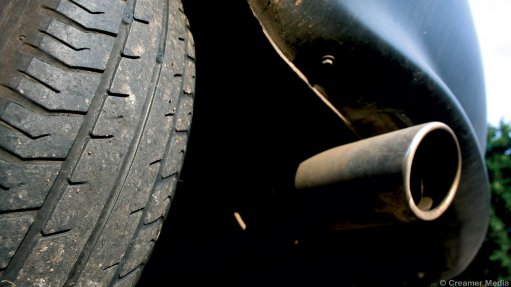
Photo by: Duane Daws
The local automotive industry objected to the increase in vehicle emission tax as noted in Wednesday’s national Budget, in light of the absence of cleaner fuel in South Africa, said National Association of Automobile Manufacturers of South Africa (Naamsa) president Dr Johan Van Zyl.
“The availability of clean fuels is essential to enable the industry to offer customers high technology, highly fuel-efficient and low-emission new motor vehicles in South Africa. [It] is also essential to reduce the emission of hazardous gasses harmful to human health and the environment.
“Naamsa will seek clarity on this particular matter,” he noted.
The legislative process around the introduction of cleaner fuels had stalled in recent years, owing largely to questions over who would fund the required investment at South Africa’s refineries.
According to Budget documents, the carbon dioxide (CO2) emission tax on new vehicles would, on April 1, increase from R90 to R100 for every gram per kilometre of CO2 over 120 g/km. In the case of double cab bakkies, the tax rises from R125 to R140 for every g/km over 175 g/km.
The aim of the tax was “to encourage consumers to use more fuel-efficient, low-carbon emitting vehicles, and for vehicle manufacturers to improve fuel efficiency”.
Van Zyl also highlighted the Budget’s extension of the base on which the tyre levy of R2.30/kg would be imposed.
This levy now affected all imported new, used or retreaded
tyres, as well as tyres fitted to all types of motor vehicles, including off-road vehicles, golf carts and helicopters.
“The implications would have to be evaluated by the affected parties,” he noted.
According to the Budget announcement, the levy was intended to reduce waste, while “encouraging reuse, recycling and recovery, and discouraging disposal into landfills”.
While the Budget would probably be reasonably well received by international and local investors, Naamsa would have liked to see more emphasis on cuts in government expenditure, the implementation of measures to improve the management of State-owned enterprises and steps to achieve higher levels of efficiency in government departments, added Van Zyl.
However, he also had praise for Finance Minister Pravin Gordhan and his team.
“A positive feature was the reiteration of government’s commitment to fiscal discipline, a progressive reduction in the budget deficit and the intensified implementation of the National Development Plan to promote growth and employment.”
Van Zyl also welcomed the fact that the Budget did not contain major tax shocks in respect of value-added tax and personal income tax.
“The Minister had also correctly identified the need for policy coherence and certainty, as well as improved policy coordination between various government departments.”